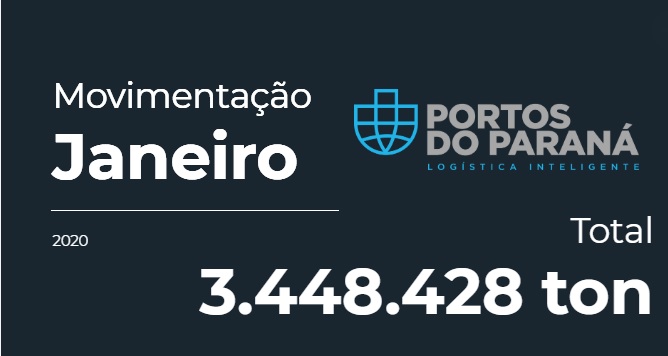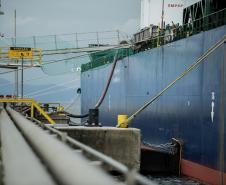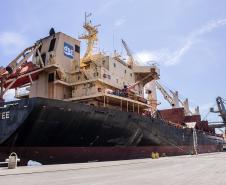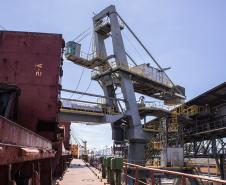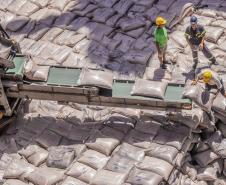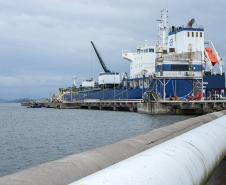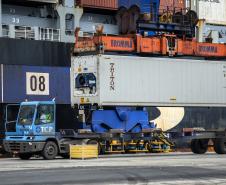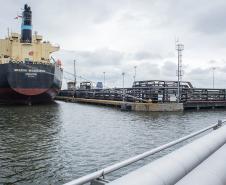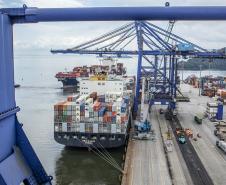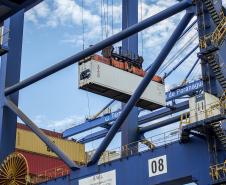Ports of Paraná register increase in general cargo and liquid bulk 10/02/2020 - 16:13
The ports of Paranaguá and Antonina handled 3.44 million tons of cargo in the first 31 days of the year. January was a month of high volumes of general cargo and liquid bulk, both import and export. With great variety, the Paraná terminals have stood out, mainly, in the movement of sugar in sacks, containers, vegetable oil and petroleum derivatives.
According to the data released this Monday (10), by the public company Portos do Paraná, more than 55% of the movement (1.9 million tons) is still of solid bulk. However, the greatest growth is in shipments and landings of liquid bulks (25% compared to the same month of the previous year) and general cargo (19% increase in the period).
In the first month of 2020, the ports of Paraná handled 610,37 thousand tons of liquid bulk. In the same month of the previous year it was 487,835 tons.
Within this segment, the products with the greatest increase are petroleum derivatives, whose export volume (103,528 tons) is 491% higher than in January of last year (17,517 tons). Imports rose 35% from 275,884 tons in January 2019 to 371,518 tons in 2020.
The operators of these products, through the Port of Paranaguá, are CPA, CBL, Transpetro and Cattalini - the latter being responsible for 43% of movements. According to Cattalini, when they talk about petroleum derivatives they are mainly talking about Diesel (S-10 and S-500) and gasoline, especially imports. "This is a market that has gained momentum in recent years, mainly guided by the price policy that has been consistent and accompanied the international market," as they comment.
VEGETAL OIL - The movement of vegetal oils, mainly soybean oil, was 27,548 tons in January. The volume is 6% higher than in the first 31 days of 2019. These products are exported, mainly to Asia.
The main consumers of vegetal oil exported by the Port of Paranaguá are China and India, according to Cattalini. As they say, however, the expectation for the year is a reduction in vegetable oil exports, motivated by the increase in the biodiesel blend in diesel oil, which is foreseen in a national decree (from 11 to 12%).
This expected reduction, however, does not bother the operator. This is because the reduction in soybean oil exports is in line with the expected increase in imports of methyl oil, methanol, which is one of the main products used in the manufacture of biodiesel. The expected increase is of about 10% in methanol movement (coming mainly from Trinidad and Tobago, Chile, Venezuela and Argentina).
Considering all the liquids it moves, the company's (Cattalini) goal is to reach 4.4 million tons in 2020, a volume almost 15.8% higher than that moved in 2019 (3.8 million). Motivated mainly by the increase in oil derivatives.
GENERAL CARGO - In January, the ports of Paraná handled 917,855 tons of general cargo. The volume is 19% higher than in the first month of 2019. Bagged sugar exports and container handling in both directions are noteworthy.
In the first days of last year there was no shipment of bagged sugar. This year, however, 25,077 tons were exported to Africa, generating a 17% increase for the sugar segment in general, even the bulk product having dropped 10%.
The operation was performed by Marcon, in the Port of Paranaguá. According to the company's operations department, currently the export cycle of the bags no longer follows the pattern of defined months. "Bagged sugar exports always occur from April to November. However, in recent years, there has been a change due to market conditions. Today Brazil competes with India, Thailand, Pakistan and Vietnam, countries closer to the importing areas, whose sea freight is more rewarding. This has affected our exporters," they explain.
Africa and Asia are the main destinations for the product, which comes mainly from the states of São Paulo and Paraná. In bags, the sugar exported by the ports of Paraná can be granulated or refined. A good volume is expected for 2020, considering that production in India was low, as stated by the Marcon representative.
CONTAINERS - Paraná currently has the largest capacity for handling containers in Brazil. The Paranaguá Container Terminal (TCP) handles the most different products, with emphasis on frozen chicken for export and fertilizers for import.
In January this year, 74,976 TEUs (unit of measure) were imported and exported via the Port of Paranaguá. The total is 20% higher than the one handled in 2019, when there were 62,617 TEU.



